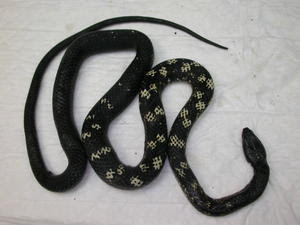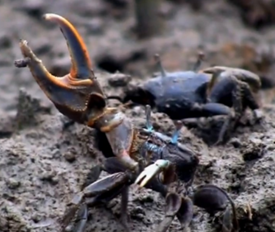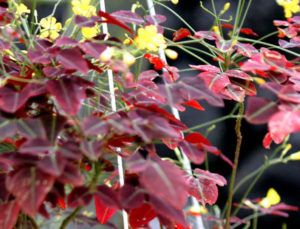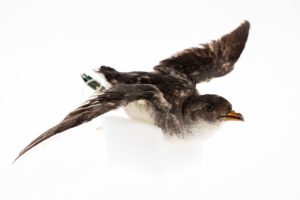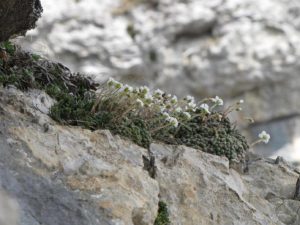un petit mot crabe-c’est-ma-faute
For trombone and percussion (2021)
Commissioned by the Australian National Academy of Music (ANAM) as part of The ANAM Set (2021); the ANAM Set was funded by the Restart Investment to Sustain and Expand (RISE) Fund – an Australian Government Initiative.
When I made my pitch for inclusion in the ANAM Set group of 67 composers—one per each student performer at ANAM—I nominated trombone as my instrumental preference, with percussion if possible. At the time I had works under way or queued up for vibraphone, clarinet d’amore, bassoon, contrabass, piano, flute, and bass clarinet, representing the entire set of orchestral families–except brass. I had not written for a brass instrument in at least a decade, and that seemed to me unforgiveable. I love trombone.
The poem from which the piece gets its name is by the late Martinican poet , founder and one of the most significant figures of the Négritude movement. Titled Internonce, from the moi, laminaire collection of 1982, there is no point pretending it is an easy poem; it achieves its effect through the rhythmically evocative text, which makes me personally think of the ‘salt-tang of a Caribbean tidal pool’. Curious about what a crabe-c’est-ma-faute might be, I eventually found it described in , and discovered that it is another name for the fiddler crab family. The name, mea culpa crab, refers to the enormous, asymmetric, claw that males possess for courtship posturing; when they beat their carapaces with this large claw they resemble breast-beating Catholics declaiming the mea culpa, mea maxima culpa of the confiteor rite. I was amused by the way the mea culpa appellation acts as an ironic subversion of the crabs’ alpha-male posturing. What made me think of the trombone in particular for this piece was seeing film of these male crabs raising their large claw almost vertically, presumably as a threat: they looked disconcertingly like a trombonist raising his bell in the dramatic pavillon en l’air fashion. See the image gallery.
The time when I was working in a record shop in Wimbledon, the early seventies, saw a remarkable upswing in interest in what had previously only been a niche music–reggae. I had visited shabeens earlier, so I was aware of the soundworld, but the appearance of Burning Spear’s album, with its dub companion Garvey’s Ghost, properly got my attention. Over the rest of that decade I explored a variety of reggae stylings, from the rocky, angry, political reggae of , to the hauntingly archaic-sounding . A musician who featured widely on these albums was , the Cuban who grew up in Jamaica and became the go-to reggae trombonist. His break-through album Man from Wareika was one of those that was in frequent rotation on my Linn Sondek. As were a range of dub albums, in particular King Tubby Meets Rockers Uptown by singer and melodica player .
Unsurprisingly, when I came to write un petit mot crabe-c’est-ma-faute, a work vaguely sited in the West Indies, the long-familiar sounds of these Jamaican musicians floated up to the forefront of my thinking. It is of course true, that the Francophone Caribbean nations have not had the same history of reggae music, being more invested in the calypso and zouk, but, then, the ‘Caribbean’ of my piece is a dream-place, a non-location, and I felt free to draw on these musics that I have loved for so long—nearly fifty years at last count. The influence of dub reggae is most overt in the rhythmic shapes and bass, and the use of the melodica (played by the percussionist—their only tuned material beyond a single chime-bar) at important structural points; I chose the lonely sound of the melodica to impart a sense of isolation and melancholy to the music. To emphasise this marginality I limited the percussion to single instances of each instrument: one woodblock, one templeblock, one tamtam, et cetera, and instruments that exist singly, such as whip, ratchet, claves, anvil. This minimises the opportunity for melodic percussion writing, and instead prioritises timbral pointillisme so as to abstractly emulate the sounds of the tidal pool environment. I have to admit I recognise the influence of my old friend on much of my percussion writing, particularly in the crabe.
Although I didn’t realise it at the time, ANAM did me a huge favour by choosing trombonist Cian Malikides to perform my piece, with the superlative percussive assistance of Alex Meagher. Cian was not yet a new music player when we first met, and I’m fairly sure his initial reaction to the score was a variant on “whatun petit mot crabe-c’est-ma-faute as one of my best pieces.
The recording on this page was made without audience at the Melbourne Recital Centre by the ABC: producer Duncan Yardley, and engineer Russell Thomson. My understanding is that it was made the day before the première, prior to it even being whistle-tested by an audience. It is therefore all the more startling as an achievement. I asked my colleague Andrew Bernard to do a small degree of sonic enhancement to the audio; the sound level has been raised to give a little more presence, nothing else is changed.
In 2020, when we all entered the living death of lockdown, I embarked on an ongoing series of pieces to occupy my time; un petit mot crabe-c’est-ma-faute is the seventh of these pieces, and as yet the only duo. I christened this set the Iso-études, and the other such pieces have their own pages elsewhere.
The original ANAM requirement was a piece of about six minutes, but in early discussions with Cian we decided that the duration was less important than the effectiveness of the piece. I admitted that I really don’t like writing pieces on scales much less than 8 minutes, and he was in agreement. The piece eventually clocked in at about 13-14 minutes, which though a decent size, was somewhat too long for the performance on May 13 2022, and I made a judicious cut so that pages 19 and 25 of the original were conflated.
This edited score, formally known as the Abbreviated Score, was the one used for the recording on this page, and it is permissible to use it for future performances where time is limited. It is, nonetheless, not the definitive version of the score, which is the one under the Score tab.
un petit mot crabe-c’est-ma-faute (trombone & untuned percussion) (12′) (2021)
internonce from moi, laminaire
by Aimé Césaire
© Editions du Seuil, 1982
internonce
| il m’arrive de le perdre | off and on i lose it |
| des semaines | for weeks |
| cést ma créature mais rebelle | it is my creature but a rebellious one |
| un petit mot couresse | a little word couresse |
| un petit mot crabe-c’est-ma-faute | a little word through-my-fault-crab |
| un petit mot pétale de feu | a little word petal of fire |
| un petit mot pétrel plongeur | a little word diving petrel |
| un petit mot saxifrage de tombeaux | a little word tomb saxifrage |
| petit mot qui m’atteste je te lance tiaulé | little word that gives evidence of me i throw you trillando |
| dans le temps et les confins | into time and the outer reaches |
| assistant à ton assaut sévère | witnessing your severe assault |
| spectral et saccadé | spectral and spasmodic |
| et de mon sang luciole parmi les lucioles | and of my own blood a firefly among the fireflies |
Translated by Clayton Eshleman and Annette Smith
© Caraf Books, the University Press of Virginia, 1990
Commissioned by the Australian National Academy of Music (ANAM) as part of The ANAM Set (2021); the ANAM Set was funded by the Restart Investment to Sustain and Expand (RISE) Fund – an Australian Government Initiative.
Cian Malikides (trombone) & Alex Meagher (percussion)
Studio recording made in the Melbourne Recital Centre in May 2022.
Producer: Duncan Yardley
Engineer: Russell Thomson
